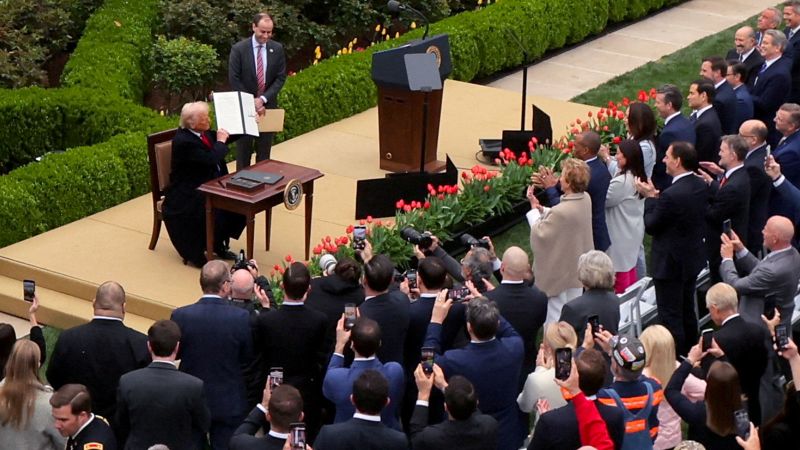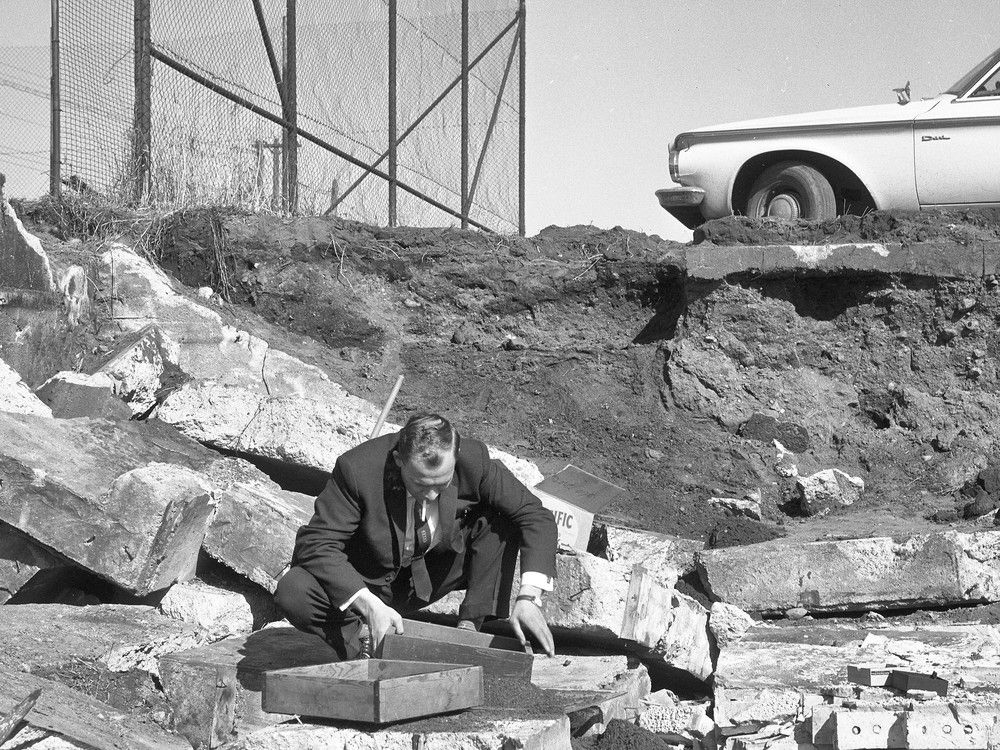
Donald Trump just took the greatest political gamble with the US economy of any modern president. Presidents normally try to do everything they can to avoid upsetting the country’s economic engine and global stability — especially if unemployment is low and growth is ticking over, as it was when he took over from Joe Biden. But with his stunning outburst of new tariffs on almost all imports from 185 nations, Trump administered an extraordinary shock that went against the advice of almost every economic expert and the lessons from some of history’s grimmest omens.
He went with a lifelong belief in the mystical power of making imported goods uncompetitive to boost domestic production. No matter that trade wars tend to end badly and that tariffs are more a feature of the 19th century than the 21st. In a surreal appearance in the White House Rose Garden Wednesday, Trump clung onto a big poster that showed new tariff rates as it swayed in the wind.

The world saw an unrestrained president in the sole spotlight he adores, hazarding the economic fates of billions of people with an outlandish political bet. The biggest political surprise is that Trump — in the name of reviving the economic prospects of post-industrial regions ravaged by the loss of jobs and factories abroad — is about to inflict real pain on Americans. He was elected five months ago in large part because voters were frustrated at high prices for groceries and housing after grinding inflation inflicted by Covid-19 and after the Biden administration’s spending helped overheat the economy.
Democratic nominee Kamala Harris had few good answers when asked how she’d cut prices. But Trump projected blue-collar solidarity by working the fries station at a Pennsylvania McDonalds. Yet he’s gone all-in on a policy that will make almost everything people buy — from fast food to electronics, cars to new homes — pricier.
Poorer people will get hurt more than Trump’s rich friends, as will those who live on fixed incomes and can’t bear to look at their plunging 401ks. He told NBC at the weekend that he “couldn’t care less” if the cost of buying cars shoots up. His new tariff experiment suggests that he means it.
It’s a staggering piece of political positioning for a billionaire president who heads a Cabinet of fellow billionaires and millionaires. Foreign nations sure to hit back No one can predict exactly how this gambit will play out. Assuming the full range of tariffs are implemented and there are no last minute opt-outs — a possibility that can’t be ignored given Trump’s past reversals — the world is set for a full-scale trade war.
Foreign leaders are as subject to political factors as Trump is. And they will be under fierce pressure to hit back at the US for a universal tariff of 10% on almost all nations, plus much higher rates for nations he said are the worst offenders. It’s hard to think of a more loyal US ally than Australia.
But its Prime Minister Anthony Albanese warned, “This is not the act of a friend.” Foreign reprisals could set up an escalation ladder and make Trump — who always wants to get the last word — feel he’s got no option but to respond. The president didn’t explain why it made sense for the world’s mightiest economy to launch a trade war with tiny, troubled nations like Cambodia with a 49% tariff.
Or why it’s a good idea to make life even harder for developing countries in Africa. And is he really going to wage economic fights with penguins? The White House tariff list included the tiny Heard and McDonald Islands in Antarctica which are getting hit with a 10% tariff – despite being little more than a haven for seabirds. The other great political risk from his new approach — which obliterates the free trade global system the United States spent decades building — is that it’s unlikely Trump will get a short-term political payoff from his wager.
Many analysts believe that it’s a fantasy that manufacturers will decide to build new factories and supply chains in the US as Trump promises they will. But even if they did, the chances of it happening during his term — or even in the third term he’s teasing despite constitutional prohibitions — are very slim. While the tariffs will raise hundreds of billions of dollars for the US Treasury, it’s unclear whether voters will buy into his claim that they will all get compensated for higher prices — an effective new tax — in his promised tax cut bill.
And all signs point to a measure, if it passes, that proportionally favors the very rich. A test of Trump’s brand as defiant businessman There is no doubting the audacity of Trump’s big declaration of “Liberation Day” on Wednesday. For weeks, he’s made tariff threats and then suggested he’d pull back.
His supporters on Capitol Hill voiced the familiar trope that his bluster represented the master chess moves of an unbeatable deal maker. But barring a reversal that would turn into a major political climbdown, given his choreographing of a “historic” turning point for America, Trump is not blinking this time. “This will be a very big moment.
I think you’re going to remember today,” Trump told Cabinet members and congressional leaders. “It’s going to be a day that hopefully you’re going to look back in years to come and you’re going to say, ‘You know, he was right. This has turned out to be one of the most important days in the history of our country.
’” Trump’s sense that he created a turning point is probably right: Some economists predict a return to the kind of trade barriers that caused the 1930s Great Depression will spark a recession. “This is one of the most important days, in my opinion, in American history. It’s our declaration of economic independence,” the president said.
For once, Trump’s hyperbole could come back to haunt him. Yet, Trump has an army of faithful voters who share his hatred of experts and establishment economists. His argument that the world is always ripping America off helped him win two elections.
As he put it on Wednesday, “For decades, our country has been looted, pillaged, raped, and plundered by nations near and far, both friend and foe alike.” He added: “American steel workers, auto workers, farmers and skilled craftsmen ..
. they really suffered gravely. They watched in anguish as foreign leaders have stolen our jobs, foreign cheaters have ransacked our factories, and foreign scavengers have torn apart our once beautiful American dream.
” Trump’s two terms are proof that the benefits of globalization are not universally shared. Many of the swing states Trump won in 2016 and 2024 are scarred by industrial decline. Voters there remember promises made to them by previous presidents and think they were lied to.
“In the coming days, there will be complaints from the globalists and the outsourcers, and special interests and the fake news,” Trump told his audience at the White House — and his supporters sitting at home. “But never forget every prediction our opponents made about trade for the last 30 years has been proven totally wrong.” If Trump bucks economic orthodoxy and returns prosperity to depressed regions his against-the-grain beliefs will be validated and his legacy will reflect his boldness.
Sen. Tommy Tuberville explained that his constituents still trust the president. “They believe him, and he’s trying something different.
We have to have a different game plan.” The Alabama Republican and former Auburn football coach insisted: “We can’t continue to run up the middle; sooner or later, we’re going to have to throw a pass, and that’s what he just did.” An opening for Democrats if things go wrong But the economic situation is more complicated than a college football playbook.
One reason why the US has sometimes had smaller tariffs than its rivals is because of the power of the American consumer, the wealth of its own economy and the reasoning that a free trade system in which the United States is the dominant force makes the country even more powerful. It’s now going to get much harder for Americans to afford new cars, flat screen televisions and even to fill their grocery carts every week. If prices rise and inflation spikes, consumers could pull back, causing growth to slow into a recession — and the president will have handed Democrats a political gift.
Footage of his Rose Garden session will anchor thousands of campaign ads in the 2026 midterms and the 2028 election. Trump’s trade “Liberation Day” comes at a moment when the turmoil of the last two months may be souring voters on Republicans. In one of the first political tests of Trump’s second term, a liberal candidate easily won a critical election in Wisconsin that decided the political destiny of the state Supreme Court.
Chalk up a clear rebuke for Trump and his government-gutting friend Elon Musk. The Democratic Party that has struggled to find an effective message against Trump could hardly miss after the pageantry of his tariff party. “This is a huge tax on American families, all to help billionaires get a tax cut,” Democratic Senate Minority leader Chuck Schumer said.
Some Republicans might agree. Four of their number in the Senate tried to send a warning to the president on Wednesday evening, by voting with Democrats on a purely symbolic measure aimed at blocking tariffs on Canada. But whether the country is headed over an economic cliff or to the new golden age that he’s promising, his party — and every other American — is going with him.
.















